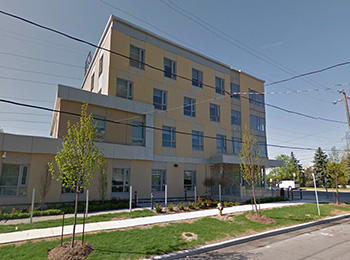TORONTO — B’nai Brith Canada’s financial difficulties continue to mount.
Only a short time after the fraternal organization put its national headquarters up for sale, B’nai Brith Hillel of Toronto, which is housed at B’nai Brith’s national headquarters, sought court approval to seek a buyer for One Kenton, a residence in Toronto for patients suffering from dementia.
The Ontario Superior Court of Justice has approved the application by B’nai Brith Hillel, which owns the property at 1 and 3 Kenton Dr., and One Kenton Alzheimer Centre for Excellence, which operates the residence, to seek buyers for the facility.
A. Farber & Partners has been named trustee and will steer the business through the proposed sale. If all goes according to plan, the facility could come under new ownership by Oct. 31, 2015.
According to a report by A. Farber & Partners, filed in court, B’nai Brith Hillel has debts totalling $10.9 million, while One Kenton owes creditors more than $90,000. Between them, B’nai Brith Hillel and One Kenton had $67,000 in cash on June 24 but a “burn rate” of $50,000 per month, making the status quo unsustainable.
The Bank of Nova Scotia has agreed to provide $400,000 in interim financing pending completion of the sale, court was told.
In a letter to the families of residents and in a subsequent news release, Michael Bausch, One Kenton’s acting executive director, said the facility’s owners are taking steps “to reorganize the affairs and ownership structure” of the North York facility.
The court has “approved a marketing and sales process to identify a strategic purchaser and operator of the home, as well as funding arrangements to allow the reorganization process to be completed as seamlessly as possible. This is a strategic step that is commonly used by corporations that require time to develop and implement options to stabilize their business,” Bausch stated.
He stressed that One Kenton has “negotiated lending arrangements to preserve ongoing operations throughout the reorganization process. This means that your loved one will continue receiving excellent care and quality services.
“Obviously we cannot predict the outcome of the process, but it is fair to say that our principal objective is to transfer One Kenton to a new owner in a seamless fashion so that the memory care facility is able to continue delivering high quality health care to the community,” he said.
Court documents posted online by A. Farber & Partners detail the depth of One Kenton’s economic distress. The 13,344-square-foot, 45-bed retirement home has been bleeding money since it opened.
According to an affidavit filed in court by Michael Mostyn, who is chief executive officer of One Kenton Alzheimer Centre, B’nai Brith Hillel and B’nai Brith Canada, the facility opened in December 2013 with only four residents. During 2014, there were never more than 17 permanent residents in the building, and it currently is home to only 20 people.
To break even, the facility would need 33 or 34 residents, he stated.
“The Kenton Group is presently facing a liquidity crisis and, absent further funding, it will be unable to continue its operations and meet its obligations in the ordinary course,” he stated.
According to the A. Farber & Partners report, One Kenton owes the Bank of Nova Scotia $7.1 million on a first mortgage and it owes Avcon Construction, Claude Ayache and Norel Electric, who own a second mortgage, another $1.6 million.
In addition, there are several other creditors who have claims against One Kenton, bringing the total amount owing to more than $10.9 million.
Mostyn’s affidavit values One Kenton’s assets at approximately $160,000 and its liabilities at more than $830,000. B’nai Brith Hillel’s assets are estimated at $14.1 million, with the residence valued at approximately $11.9 million. B’nai Brith Hillel’s total liabilities exceed $14.3 million, he added.
At the time it was built, One Kenton received a $5.4-million federal government grant that was earmarked for a Centre of Innovation Excellence for Alzheimer’s Care. According to a report in the Aug. 24, 2012 issue of The CJN, which is reproduced on One Kenton’s website, “the funds will be used to complete construction of the centre and hire eight employees, who will lead collaborations among industry, research and not-for-profit partners.”
When One Kenton was first conceived in 2002 by former B’nai Brith Canada head Frank Dimant and “certain donors,” it was envisioned as a 24-bed home for Alzheimer’s patients. But after an adjacent property was acquired in 2006, plans were amended to make it a 45-bed facility, Mostyn stated in his affidavit.
The facility was expected to be a state-of-the-art, personalized facility with a staff to resident ratio of three to one. The research facility was expected to lead to developments that would enhance the quality of life of residents.
Mostyn did not respond to requests for comment by The CJN’s deadline.
